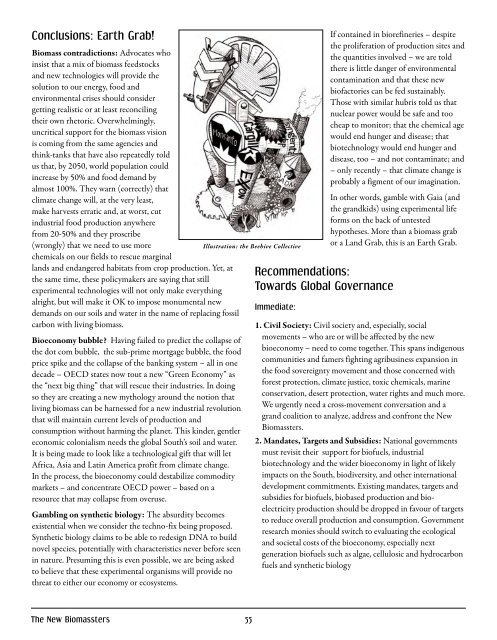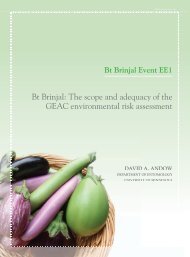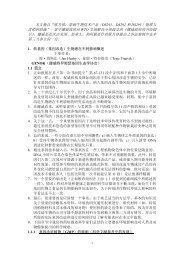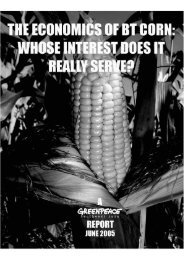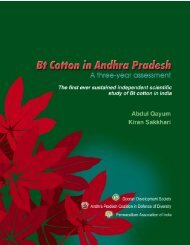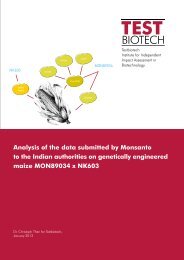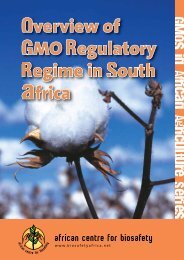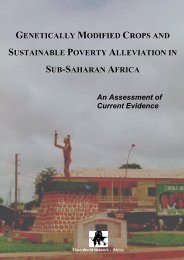English - pdf - 2145 Kb - Biosafety Information Centre
English - pdf - 2145 Kb - Biosafety Information Centre
English - pdf - 2145 Kb - Biosafety Information Centre
- No tags were found...
Create successful ePaper yourself
Turn your PDF publications into a flip-book with our unique Google optimized e-Paper software.
Conclusions: Earth Grab!Biomass contradictions: Advocates whoinsist that a mix of biomass feedstocksand new technologies will provide thesolution to our energy, food andenvironmental crises should considergetting realistic or at least reconcilingtheir own rhetoric. Overwhelmingly,uncritical support for the biomass visionis coming from the same agencies andthink-tanks that have also repeatedly toldus that, by 2050, world population couldincrease by 50% and food demand byalmost 100%. They warn (correctly) thatclimate change will, at the very least,make harvests erratic and, at worst, cutindustrial food production anywherefrom 20-50% and they proscribe(wrongly) that we need to use morechemicals on our fields to rescue marginallands and endangered habitats from crop production. Yet, atthe same time, these policymakers are saying that stillexperimental technologies will not only make everythingalright, but will make it OK to impose monumental newdemands on our soils and water in the name of replacing fossilcarbon with living biomass.Bioeconomy bubble? Having failed to predict the collapse ofthe dot com bubble, the sub-prime mortgage bubble, the foodprice spike and the collapse of the banking system – all in onedecade – OECD states now tout a new “Green Economy” asthe “next big thing” that will rescue their industries. In doingso they are creating a new mythology around the notion thatliving biomass can be harnessed for a new industrial revolutionthat will maintain current levels of production andconsumption without harming the planet. This kinder, gentlereconomic colonialism needs the global South’s soil and water.It is being made to look like a technological gift that will letAfrica, Asia and Latin America profit from climate change.In the process, the bioeconomy could destabilize commoditymarkets – and concentrate OECD power – based on aresource that may collapse from overuse.Gambling on synthetic biology: The absurdity becomesexistential when we consider the techno-fix being proposed.Synthetic biology claims to be able to redesign DNA to buildnovel species, potentially with characteristics never before seenin nature. Presuming this is even possible, we are being askedto believe that these experimental organisms will provide nothreat to either our economy or ecosystems.Illustration: the Beehive CollectiveIf contained in biorefineries – despitethe proliferation of production sites andthe quantities involved – we are toldthere is little danger of environmentalcontamination and that these newbiofactories can be fed sustainably.Those with similar hubris told us thatnuclear power would be safe and toocheap to monitor; that the chemical agewould end hunger and disease; thatbiotechnology would end hunger anddisease, too – and not contaminate; and– only recently – that climate change isprobably a figment of our imagination.In other words, gamble with Gaia (andthe grandkids) using experimental lifeforms on the back of untestedhypotheses. More than a biomass grabor a Land Grab, this is an Earth Grab.Recommendations:Towards Global GovernanceImmediate:1. Civil Society: Civil society and, especially, socialmovements – who are or will be affected by the newbioeconomy – need to come together. This spans indigenouscommunities and famers fighting agribusiness expansion inthe food sovereignty movement and those concerned withforest protection, climate justice, toxic chemicals, marineconservation, desert protection, water rights and much more.We urgently need a cross-movement conversation and agrand coalition to analyze, address and confront the NewBiomassters.2. Mandates, Targets and Subsidies: National governmentsmust revisit their support for biofuels, industrialbiotechnology and the wider bioeconomy in light of likelyimpacts on the South, biodiversity, and other internationaldevelopment commitments. Existing mandates, targets andsubsidies for biofuels, biobased production and bioelectricityproduction should be dropped in favour of targetsto reduce overall production and consumption. Governmentresearch monies should switch to evaluating the ecologicaland societal costs of the bioeconomy, especially nextgeneration biofuels such as algae, cellulosic and hydrocarbonfuels and synthetic biologyThe New Biomassters 55


